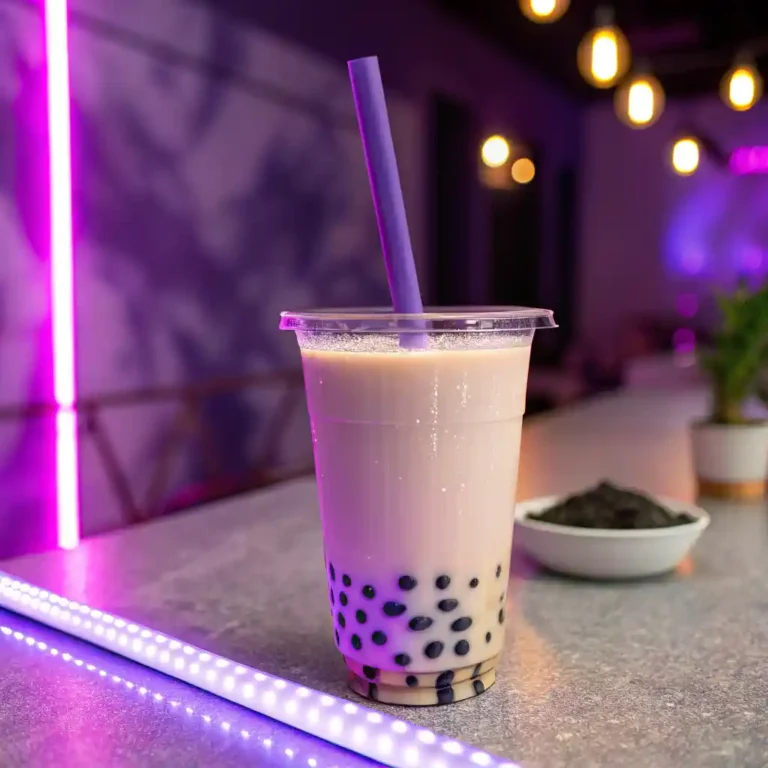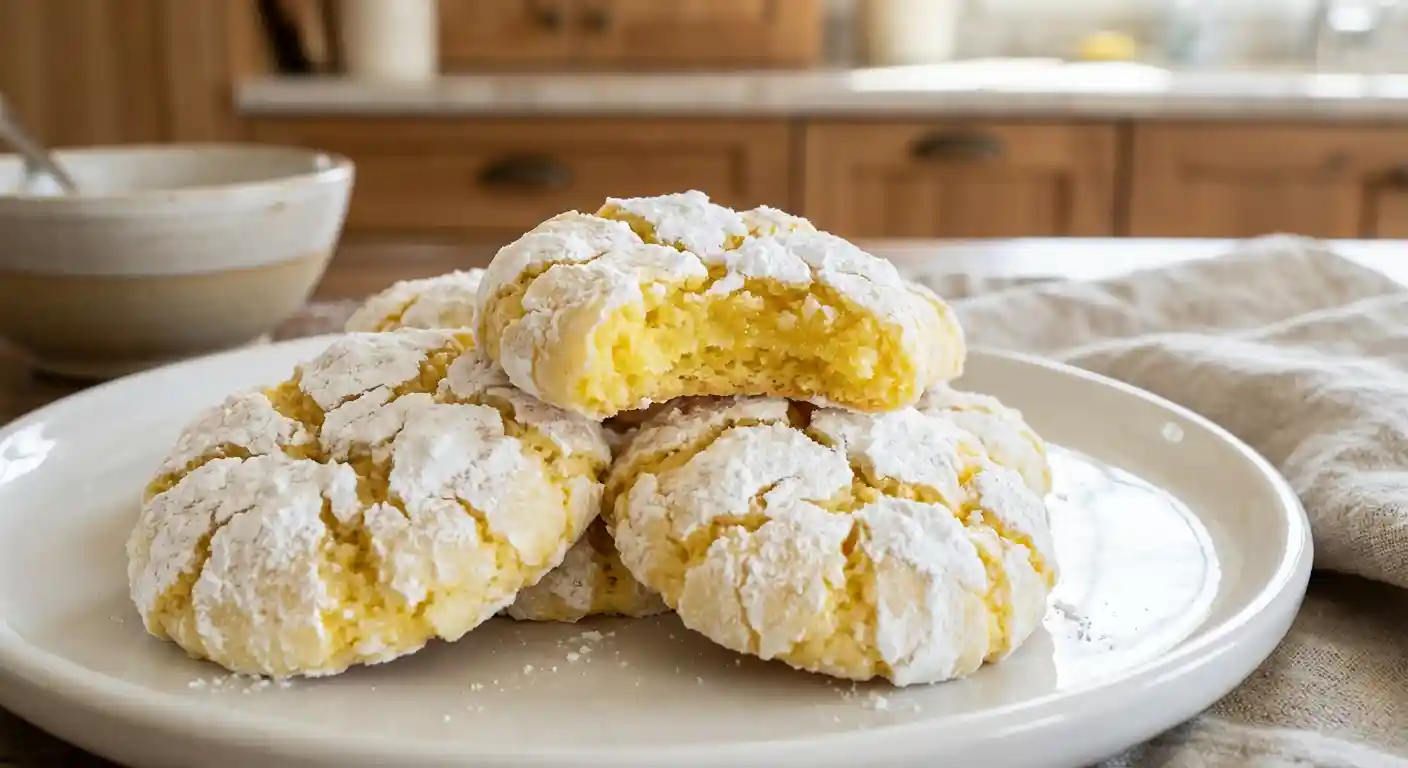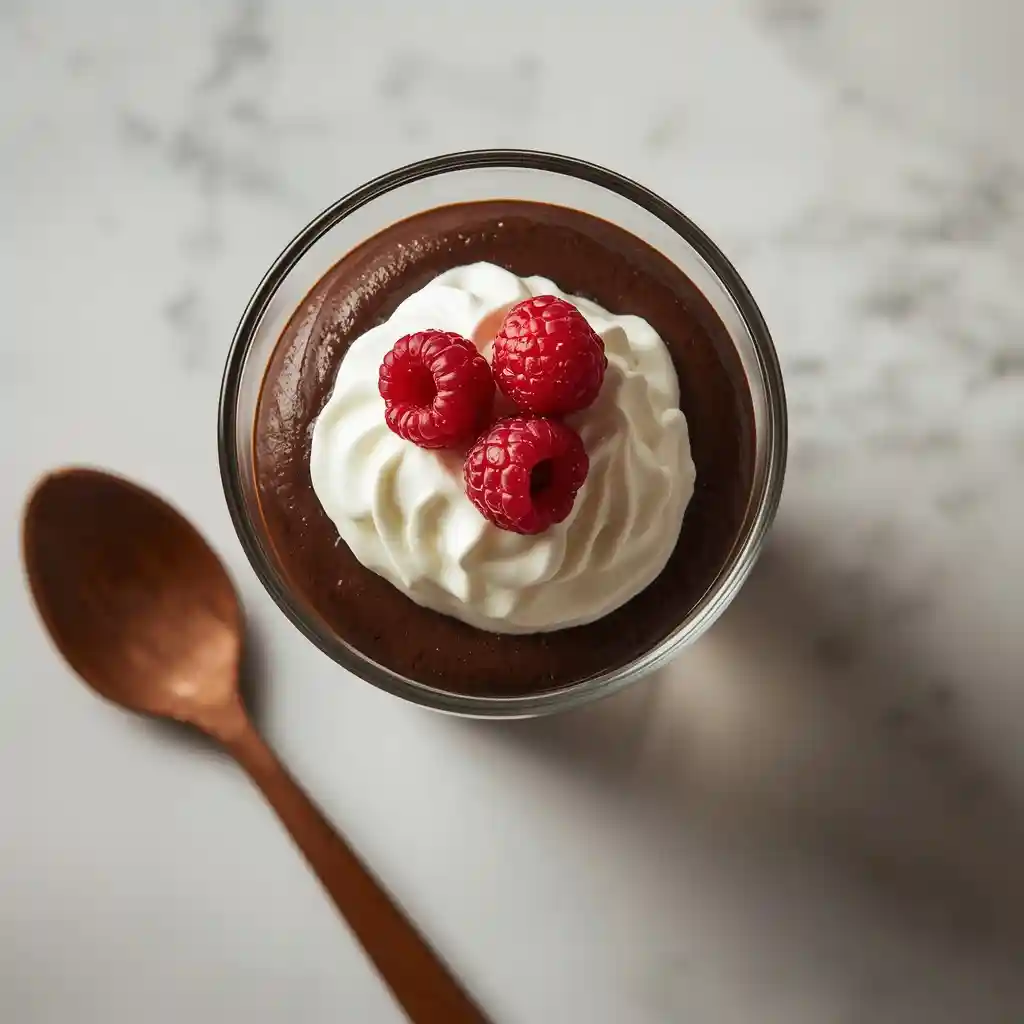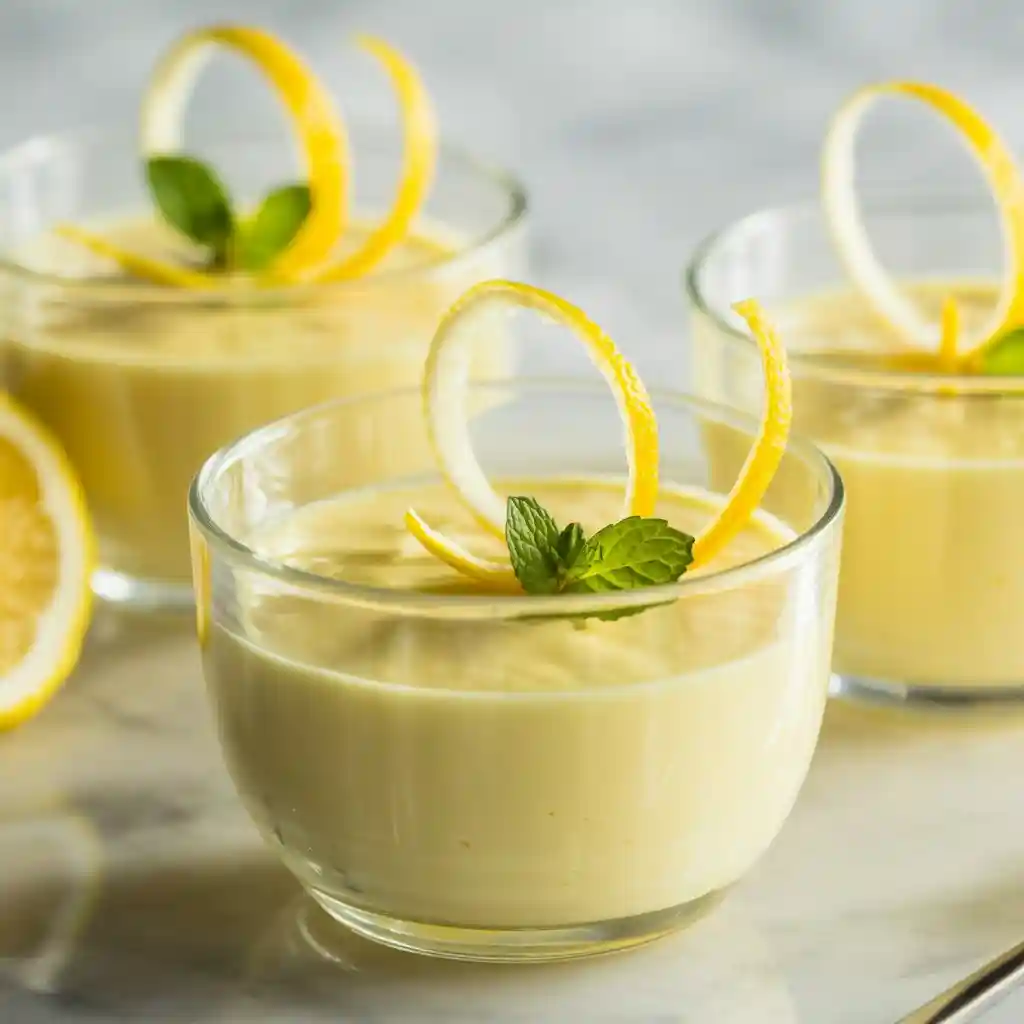Ever taken a sip of something and thought, “What on earth is this… and why do I love it so much?” That’s the exact feeling most people have the first time they try taro bubble tea. It’s creamy, slightly nutty, totally Instagram-worthy with its pastel purple hue, and somehow tastes like dessert in a cup. But what is taro, anyway? And why is everyone so obsessed with turning it into boba?
In this guide, we’re spilling the boba on everything you need to know about taro bubble tea. From what it actually tastes like to whether it’s good for you (yes, we’re going there), how to make it at home, and even where to grab the best cup if you’re not the DIY type.
Looking for inspiration? Try this fruit ice cream recipe while you sip on your tea. Now, let’s dive right into the delicious world of taro.
JUMP TO
Table of Contents
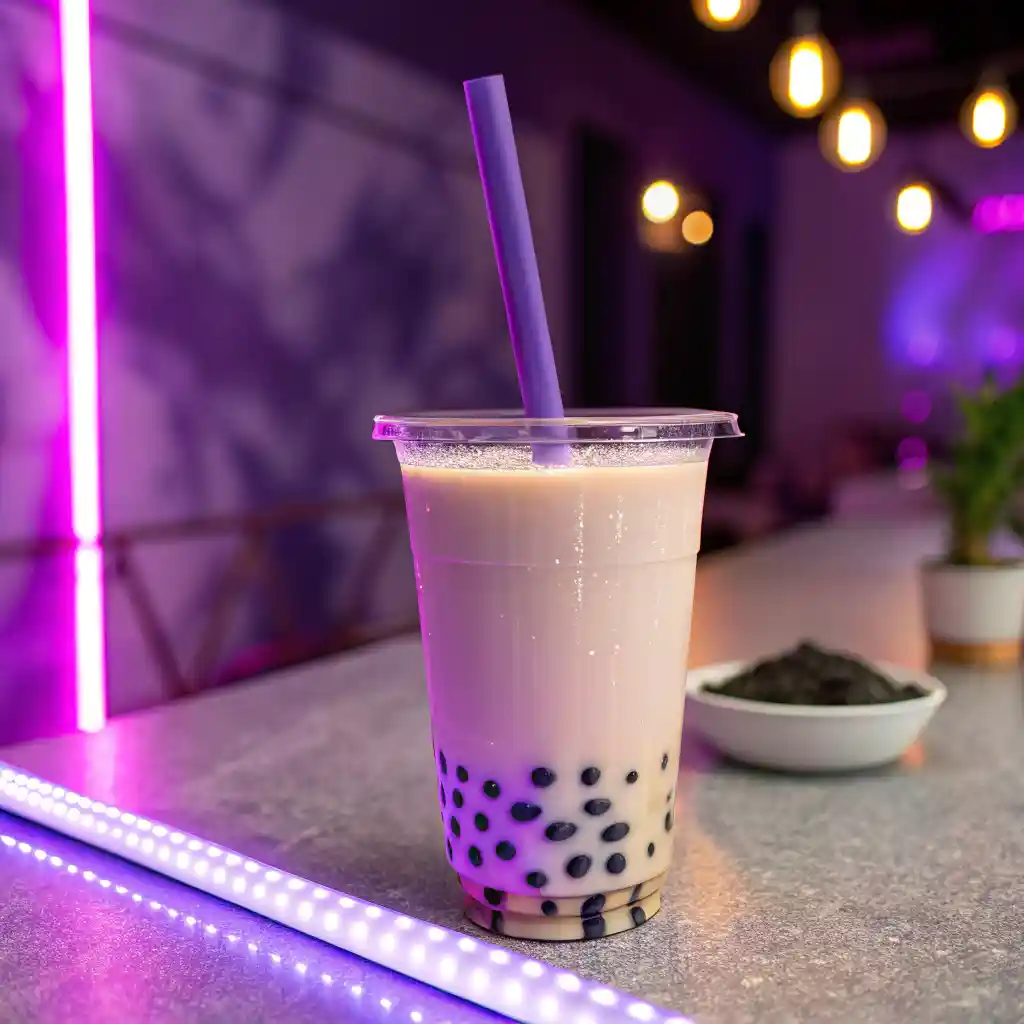
Homemade Taro Bubble Tea
Ingredients
Method
- Cook the taro – If using root, steam or boil it until soft, then mash it smooth. If using powder, skip this.
- Brew your tea – Let it cool before mixing.
- Blend it – In a blender, toss in the taro, milk, tea, and sweetener. Blend until creamy and smooth.
- Prepare your pearls – Boil tapioca pearls according to the package, then soak them in honey or syrup for flavor.
- Assemble your drink – Add tapioca to the bottom of a glass, pour in the blended mix, toss in some ice, and give it a stir.
Notes
What Is Taro Bubble Tea?
Origins and History of Taro in Beverages
Alright, first things first. Taro is a starchy root vegetable that resembles a potato but stands out with its distinctive purple hue. This ancient crop has been a dietary staple in Southeast Asian and Pacific Island communities for generations. But when Taiwan brought together taro, milk, tea, and chewy tapioca pearls back in the ’80s, it was a game-changer. This is the origin story of today’s popular taro bubble tea.
This drink didn’t just stay local. The flavor gained international recognition and has become a leading choice among bubble tea enthusiasts globally. You’ll spot it on every boba shop menu, right next to the classics like matcha and brown sugar milk tea.
Understanding the Base Ingredients of Taro Milk Tea
So, what’s actually in it? Here’s what typically goes into a cup of taro bubble tea:
| Ingredient | What It Does |
|---|---|
| Taro (root or powder) | Gives that nutty, sweet flavor and purple color |
| Milk or Creamer | Makes it smooth and creamy |
| Black or Green Tea | Adds a bit of depth to the flavor |
| Sweetener | Usually sugar or syrup, depending on the shop |
| Tapioca Pearls | Chewy, fun-to-eat bubbles at the bottom |

Some versions use fresh taro root that’s steamed and mashed, while others go the easy route with taro-flavored powder. Both are tasty, but they do taste slightly different. More on that later.
Why Taro Became a Popular Bubble Tea Flavor
Honestly? It’s just that good. The flavor is subtle but unforgettable. It’s not fruity, not overly sweet, and it doesn’t punch you in the face with flavor like passionfruit or mango. Instead, it’s mellow, creamy, and just the right amount of indulgent.
Plus, the color doesn’t hurt. That soft lilac hue makes every cup super photogenic. Let’s be real, if it doesn’t look good on your feed, did you even drink it?
Discover great ideas like this banana recipe for weight loss for something lighter to pair with your boba cravings.
What Does Taro Bubble Tea Taste Like? (Revised)
Flavor Profile: Sweet, Nutty, and Creamy
Alright, let’s talk about what taro bubble tea really tastes like. If you’ve never had it before, just imagine a velvety blend of nutty, sweet goodness with a slightly starchy vibe. It’s like a cozy combo of vanilla and sweet potato — but better. Taro bubble tea brings this smooth, creamy flavor that kind of tastes like dessert and tea had a baby.
What makes taro bubble tea so unique is that it’s sweet without being sugary-sweet. It’s rich and mellow, and honestly, it’s the flavor people didn’t know they needed in their lives.
When the taro blends with milk and tea, you get a sip that’s satisfying, smooth, and strangely addictive. It’s no wonder taro bubble tea has become a staple on boba menus all over the world.
Comparing Taro Bubble Tea with Other Flavors
Taro bubble tea doesn’t scream for attention like fruity flavors. Instead, it sneaks in with this gentle, creamy vibe that surprises you in the best way. Let’s stack it up against other crowd-pleasers:
| Flavor | Vibe | Sweet Level | Goes Great With |
|---|---|---|---|
| Taro Bubble Tea | Nutty & Creamy | Medium | Rainy days and Netflix |
| Matcha | Earthy & Bold | Low | Study sessions and zen vibes |
| Brown Sugar | Deep & Rich | High | Dessert lovers unite |
| Thai Tea | Spicy & Sweet | Medium | Foodie adventures |
So, if you’re bored with fruit teas and want something that feels a little more indulgent, taro bubble tea is where it’s at. It’s perfect when you’re craving comfort in a cup.
Looking for something to snack on while sipping your taro bubble tea? Check out this super easy almond flour bagel recipe for a fun pairing.
What Makes Taro Tea Unique in Texture and Aftertaste
Besides the flavor, taro bubble tea has this thick, creamy texture that just hits different. When made with real mashed taro, you’ll get a slightly grainy richness that makes the drink feel almost like a milkshake. With taro powder, it’s a bit smoother and more consistent — still yummy, just less earthy.
And the aftertaste? Oh, it lingers. In a good way. A little nutty, a little sweet, and definitely something you’ll want another sip of. No wonder folks keep coming back for their next taro bubble tea fix.
Taro Root vs. Taro Powder: What’s Used in Bubble Tea? (Revised)
Natural Taro Root: Benefits and Limitations
Fresh taro root is the OG. It’s usually steamed or boiled, then mashed and blended into drinks. When used in taro bubble tea, it gives a super natural flavor — not overly sweet, but earthy, nutty, and seriously comforting.
One of the biggest perks? Taro root actually brings some real nutrition to the table. It’s got fiber, some potassium, and isn’t just empty sugar. But… it takes time. Prepping taro root is no joke — peeling, cooking, blending — it’s a lot of work, which is why most shops skip it.
Still, if you ever get the chance to try taro bubble tea made with fresh taro, go for it. It’s a whole new level of flavor.
Artificial Taro Powder: Flavor Enhancers and Additives
Now, let’s talk about the shortcut most places take — taro powder. This is what you’ll find in most boba shops when you order taro bubble tea. It’s sweet, creamy, and gives you that iconic lavender-purple color instantly.
The thing is, taro powder is usually loaded with flavoring agents, sugar, and sometimes even food dye. It’s convenient, sure, but not the cleanest option out there. Still, taro bubble tea made with powder is consistent, quick to whip up, and tastes delicious — even if it’s a bit more “dessert-y” than earthy.
Want to pair your sweet taro bubble tea with something unique? Don’t miss this trendy pink salt trick recipe — it might surprise you.
Which One Tastes Better and Is Healthier?
Alright, so which version of taro bubble tea wins — fresh taro or powder?
| Taro Type | Taste | Health Score | Ease of Use |
|---|---|---|---|
| Fresh Taro Root | Natural, earthy, less sweet | Higher | Takes time |
| Taro Powder | Sweet, creamy, more artificial | Lower | Super quick |
Fresh taro gives you a more authentic taste, while taro powder offers a fun, consistent hit of sweetness. If you’re making taro bubble tea at home, the powder is way easier, but if you’re chasing those homemade vibes, root’s the way to go.
Either way, taro bubble tea is a total crowd-pleaser.
Health Benefits and Risks of Taro Bubble Tea
Nutritional Breakdown of Taro Root
Let’s get into the truth about whether taro bubble tea is just a guilty pleasure or if it actually packs some health perks. Spoiler: it depends on what’s in your cup.
Taro root on its own is pretty solid. It’s got:
- Fiber to help keep things moving
- Contains Vitamin E and B6 to promote healthy brain function and skin wellness
- Potassium and manganese for heart and muscle health
So yeah, taro isn’t just some random root. It’s been used for centuries in traditional diets, especially across Asia and the Pacific Islands. If your taro bubble tea is made with real taro, you’re at least getting a taste of those natural benefits.
Is Taro Bubble Tea Healthy or Just Tasty?
Now, let’s be real — by the time taro gets turned into bubble tea, things change. The drink usually includes:
- Added sugar or flavored syrups
- Creamers or condensed milk
- Tapioca pearls (carbs on carbs)
That means one cup of taro bubble tea can run you between 250 to 500 calories, depending on size and ingredients. The drink’s still delicious, but calling it “healthy”? That’s a stretch unless you DIY a lighter version.
So, is taro bubble tea bad for you? Not at all — in moderation. Think of it like a treat, not your daily hydration plan. Want to balance it out? Sip it slowly, or pair it with something like this super refreshing tropical green smoothie.
Sugar, Calories, and Additive Insights
Here’s a little nutrition table to keep it simple:
| Taro Bubble Tea Ingredient | Concern | Better Option |
|---|---|---|
| Taro Powder | Added sugar, dyes | Go fresh taro if you can |
| Sweeteners | Spikes calories | Ask for 50% or no sugar |
| Tapioca Pearls | High in carbs, no real nutrition | Try aloe vera or chia seeds |
So yeah, taro bubble tea can be part of your life — just maybe not your post-workout fuel.

How to Make Taro Bubble Tea at Home
Step-by-Step DIY Taro Milk Tea Recipe
Can’t find a good boba shop near you? Or maybe you just wanna try making your own version that’s lighter (and possibly cheaper)? Here’s your go-to guide for whipping up taro bubble tea at home.
You’ll need:
- 1/2 cup cooked taro root or 2 tbsp taro powder
- 1 cup milk (dairy or non-dairy)
- 1/2 cup black tea (strongly brewed)
- 1–2 tbsp sweetener (honey, sugar, or syrup)
- 1/4 cup cooked tapioca pearls
- Ice cubes
Steps:
- Cook the taro – If using root, steam or boil it until soft, then mash it smooth. If using powder, skip this.
- Brew your tea – Let it cool before mixing.
- Blend it – In a blender, toss in the taro, milk, tea, and sweetener. Blend until creamy and smooth.
- Prepare your pearls – Boil tapioca pearls according to the package, then soak them in honey or syrup for flavor.
- Assemble your drink – Add tapioca to the bottom of a glass, pour in the blended mix, toss in some ice, and give it a stir.
Boom. You just made taro bubble tea from scratch. Pat yourself on the back.
Choosing Between Fresh Taro, Powder, or Premix
Wondering what works best for you? Here’s a breakdown:
| Option | Pros | Cons |
|---|---|---|
| Fresh Taro | Healthier, authentic taste | Time-consuming |
| Taro Powder | Fast, consistent flavor | More sugar, less real taro |
| Taro Premix | Easiest, no brain power needed | Least customizable |
If you’re into experimenting, try blending the two — real taro for the earthy vibes, powder for a flavor boost. Just don’t forget the boba!
Looking for more DIY goodness? Don’t miss this tasty homemade Mounjaro recipe that’s going viral for a reason.
Must-Have Tools and Ingredients for Authentic Taste
While you don’t require an entire bubble tea station in your kitchen, having some key items makes a difference:
- A good blender
- Wide boba straws (they’re a must)
- Boba pearls made from tapioca (found in Asian food stores or available for online purchase)
- A strainer for tea
After mastering these fundamentals, you’ll be able to whip up delicious taro bubble tea at home anytime you want.
Best Toppings and Variations for Taro Milk Tea
Classic Tapioca Pearls vs. Crystal Boba
You really can’t talk about taro bubble tea without getting into toppings. The OG topping? Tapioca pearls — those chewy little bubbles that give boba its name. They’re sweet, slightly squishy, and the perfect match for taro’s creamy flavor.
But if you wanna switch things up, crystal boba is another fun option. It’s made from agar (a seaweed-based gelatin) and has a more jelly-like texture. It’s also lighter and slightly fruity, which adds a cool contrast to the nutty taro base.
Still team chewy? You can stick with the classic tapioca pearls. But don’t be afraid to try something new. Taro bubble tea’s mellow flavor makes it super adaptable to all sorts of textures.
Adding Cheese Foam, Red Bean, or Grass Jelly
Feeling extra? There are so many creative toppings you can throw on top of your taro milk tea. Some crowd favorites include:
- Cheese foam – Yup, it sounds weird, but the sweet-salty combo actually works. It’s like cheesecake in a frothy layer.
- Red bean paste – Adds a little earthy sweetness and pairs beautifully with the creamy taro.
- Grass jelly – A more herbal, slightly bitter topping that cuts through the sweetness and gives a refreshing twist.
These additions don’t just change the flavor — they totally upgrade the experience of drinking taro bubble tea.
Check out this hearty snack idea to pair with your drink: crispy chicken fritta — trust us, it works.
Iced, Blended, or Hot: Serving Styles That Work
Most people go iced with their taro bubble tea — especially in summer. But did you know you can also enjoy it hot? On chilly days, a warm taro milk tea with soft boba is pure comfort.
Blended versions (basically taro smoothies) are another great twist. They feel more like dessert than a drink, especially with whipped cream on top.
Whatever style you go for, taro bubble tea is versatile. Ice it, warm it up, blend it — it always works.
Popular Taro Drinks Across Cultures
Taiwanese Taro Tea Culture
Taro milk tea got its start in Taiwan, where bubble tea was first invented. Over there, taro is more than a trend — it’s tradition. You’ll find taro in cakes, soups, even savory dishes. But in bubble tea form? It’s a national fave.
Taiwanese shops usually use steamed taro chunks in the drink, so you get those little chewy pieces with every sip. It’s more rustic, more homemade, and honestly, more delicious.
Japanese vs. Thai Taro Drink Variations
Japan does taro differently. Taro finds its way into many traditional sweets like mochi and various desserts, extending far beyond its popular bubble tea applications. But Japanese-style taro bubble tea leans toward matcha blends, creating that pretty purple-green combo.
In Thailand, taro is sometimes added to their signature Thai milk teas, giving a spiced, floral flavor mixed with the nutty taro base. Whenever you see taro Thai tea listed on a menu, don’t hesitate to order it!
Western Twists on the Traditional Taro Milk Tea
American bubble tea shops have embraced taro with incredible creativity, featuring variations like blended taro drinks, frozen taro desserts, and nutritious taro-based smoothies.
We’ve even seen taro mixed with coffee. Bold move, but surprisingly good. The natural, nutty undertones of taro beautifully balance the sharp intensity of espresso, creating a luxurious beverage that blurs the line between coffee and sweet indulgence.
Want something equally creative? Don’t miss this bold twist: fried chicken ice cream — it’s as wild as it sounds.
Taro’s popularity proves that it’s not just a trend. It’s a global favorite with endless ways to enjoy it — and we’re totally here for it.
What Is the Best Flavor of Bubble Tea? (Is Taro the Winner?)
Top 5 Most Popular Bubble Tea Flavors Ranked
With bubble tea blowing up all over the world, it feels like there’s a new flavor every week. Brown sugar? Classic. Matcha? A vibe. Honeydew? Underrated. But where does taro bubble tea rank?
Here’s our very official, very unscientific top 5 list based on taste tests, online reviews, and boba-lover opinions:
| Rank | Flavor | Why People Love It |
|---|---|---|
| 1 | Brown Sugar | Sweet, caramel-like, total dessert |
| 2 | Taro Bubble Tea | Creamy, unique, and totally cozy |
| 3 | Matcha | Earthy, bold, and slightly bitter |
| 4 | Thai Tea | Sweet, spiced, and addictive |
| 5 | Mango | Fruity and refreshing |
Yep, taro bubble tea is holding strong at #2. Why? Because it’s versatile, not overly sweet, and has that creamy vibe that people just can’t quit.
Taste Test: Why Taro Holds a Special Place
Even people who don’t usually like milk tea tend to fall for taro. It’s got that unique nutty flavor that feels familiar but different. It also complements a wide variety of add-ins beautifully – from chewy tapioca pearls to fruit jellies and sweet red beans.
And let’s not lie — that purple color adds to the appeal. Think of it as the aesthetic cousin of trendy café drinks – visually stunning, Instagram-worthy, and surprisingly soothing.
For bubble tea beginners, taro makes an excellent first choice to explore this delicious world. Not too sweet, not too strong — just smooth, creamy comfort in a cup.
Curious to try something else funky and fun? Discover the trending blue salt technique that’s captivating food lovers everywhere.
Customer Reviews and Poll Results Across the US
We checked out some popular bubble tea forums and social polls, and guess what? Taro continues to earn its place as one of the three most sought-after flavors People love it because:
- It doesn’t overpower the drink
- It pairs with both dairy and non-dairy options
- It’s kid-friendly and adult-approved
One Reddit user even said, “Taro bubble tea tastes like what I imagine hugs would taste like if they were a drink.” That’s the energy.
Where to Buy or Order the Best Taro Bubble Tea
Top Bubble Tea Chains Serving Authentic Taro Tea
If you’re craving taro bubble tea and don’t want to risk a bland or watery cup, these chains are known for nailing the flavor every time:
- Gong Cha – Rich, creamy taro with chewy boba
- Sharetea – Offers both fresh taro and taro powder options
- Tiger Sugar – Their layered taro drinks are a visual and flavor win
- Kung Fu Tea – Consistent flavor, solid texture, and tons of topping options
These chains are found in most major cities and have mobile apps so you can order ahead — because no one wants to wait in a 20-person boba line.
Online Stores for Taro Powder and Kits
Prefer to make taro bubble tea at home? There are tons of great taro powder and bubble tea kits online. Some top-rated ones include:
- Bossen Taro Powder – Sweet, easy to use, and just add water
- Buddha Bubbles Boba Kit – Comes with boba, straws, and everything you need
- Tea Zone Taro Powder – A go-to for serious DIY boba fans
Amazon, Walmart, and Asian grocery sites usually have these stocked, and they ship fast.
Looking for inspiration? Try this popular pistachio cream recipe for another creamy delight to pair with your boba.
How to Spot Real vs. Artificial Taro Drinks
If you’re ever unsure whether a shop uses real taro or just flavored powder, here are some clues:
| Real Taro | Taro Powder |
|---|---|
| Pale purple or grayish | Bright lavender |
| Mild, earthy flavor | Sweet, candy-like |
| Slightly grainy texture | Smooth and uniform |
Both versions can be tasty — just depends on what vibe you’re going for. But if you want the real-deal flavor and some health perks, go with the real taro whenever you can.
FAQs About Taro Bubble Tea
What does taro cream tea taste like?
Taro cream tea tastes like a dreamy mix of vanilla, sweet potato, and coconut — all blended into a creamy, nutty treat. It’s smooth, sweet (but not overly sugary), and has a rich mouthfeel thanks to the cream. If you love mellow dessert flavors, this one’s a keeper.
What flavor is taro in bubble tea?
The flavor profile of taro bubble tea delivers a distinctive combination of nuttiness and gentle sweetness, complemented by delicate notes of vanilla and a grounded, earthy undertone. Rather than being fruity or harsh, it offers a comforting, smooth, and subtle taste experience. Many describe it as reminiscent of cookies and cream desserts or compare it to a lavender-hued milkshake.
Is taro bubble tea healthy?
It depends. If made with fresh taro, less sugar, and dairy-free milk, it can be a better-for-you option with fiber and nutrients. But most shop-bought taro bubble tea uses powder and added sweeteners, making it more of a treat than a health drink. Like anything sweet — enjoy it in moderation.
What is the best flavor of bubble tea?
It’s all personal taste, but taro bubble tea ranks high for its creamy, unique flavor. Other favorites include brown sugar, Thai tea, and matcha. If you’re just starting your boba journey, taro is one of the best intro flavors.
Is taro bubble tea good for weight loss?
Not really — most versions have sugar, tapioca pearls (which are pure carbs), and high-calorie creamers. While taro root itself has some benefits, taro bubble tea is best enjoyed as an occasional treat, not a diet food.
Does taro have caffeine in bubble tea?
Yes, but only if it’s made with tea. Some versions of taro bubble tea are blended with black or green tea, which contain caffeine. But you can always ask for a caffeine-free version if that’s a concern.
Conclusion
So, what’s the final verdict? Taro bubble tea isn’t just a passing trend — it’s a flavor that’s stood the test of time. From its rich, nutty taste to its creamy texture and Insta-worthy color, there’s just something special about it. Whether you’re buying from a boba shop or making your own at home, taro brings a comforting, flavorful twist to the world of milk teas.
And hey, if you’re still on the fence, just try a small cup. One sip and you might just join the purple side.
Don’t miss our low-carb bagels guide if you’re looking to balance your sweet treat with a lighter bite.

